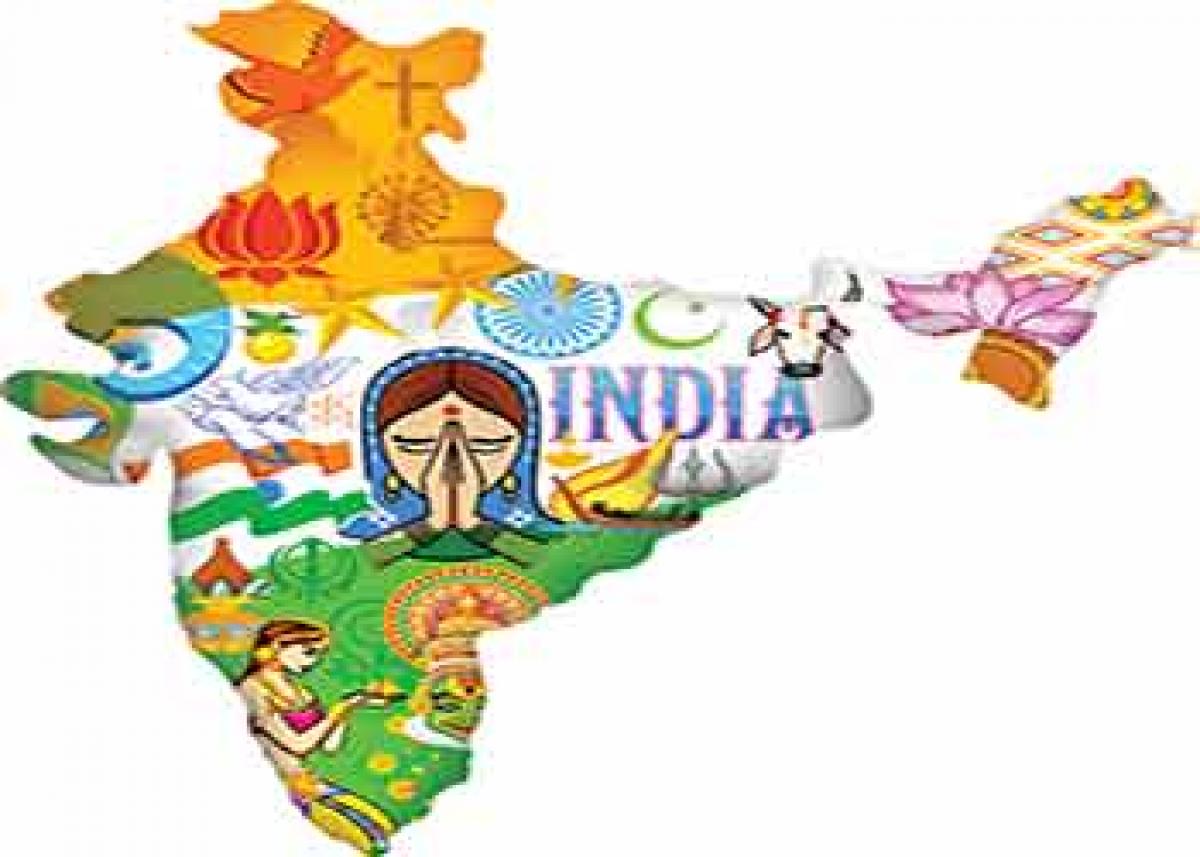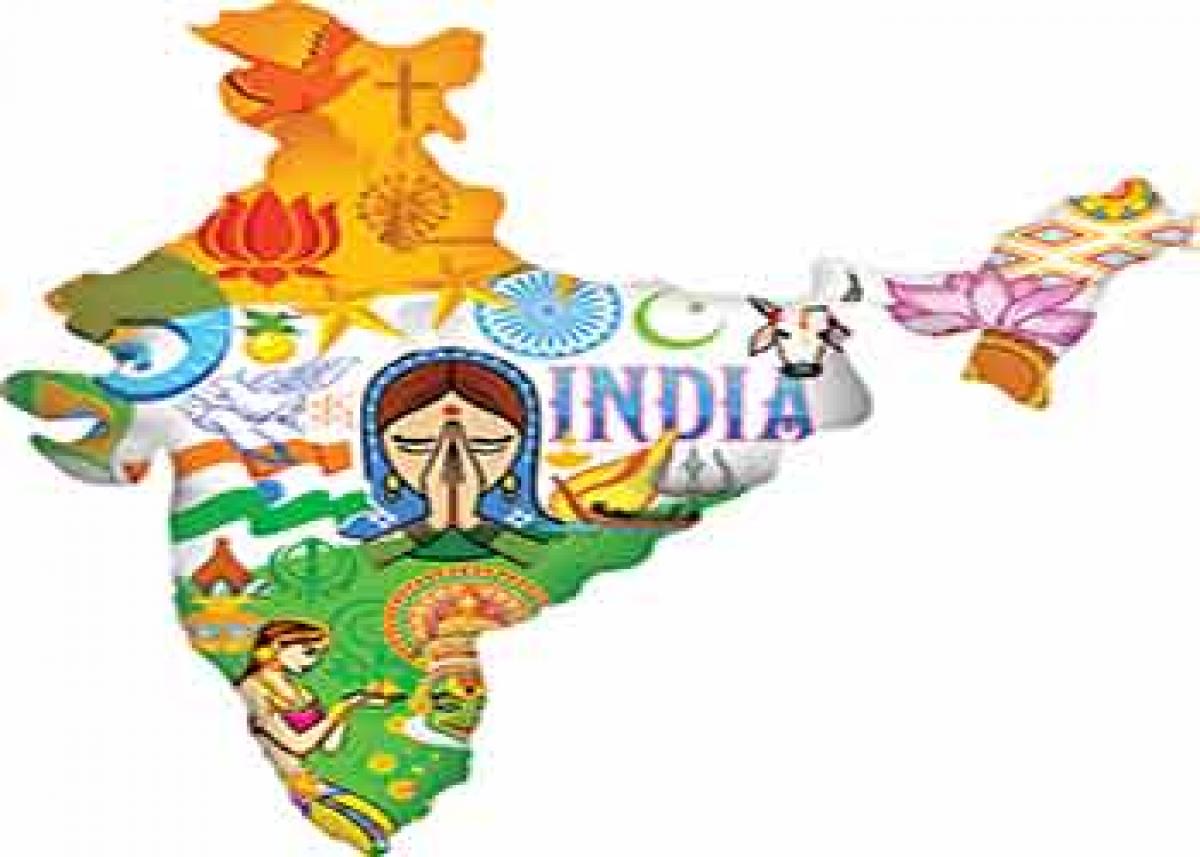Live
- PL mid-season report: Liverpool with one hand on title, Arsenal’s diminishing hopes & Man Utd’s ‘relegation battle’
- Yemen's Houthis claim downing US drone
- BRS Leader Krishank Responds to Dil Raju’s Comments
- Komaram Bheem: Forest Officials Capture c That Terrorized Villages
- Government Plans Metro Expansion in Hyderabad North City
- M&M 11th most valuable automobile manufacturer in world: Anand Mahindra
- Allegations politically motivated: Siddaramaiah on calls for Priyank Kharge's resignation
- Indian stock market ends on positive note on the first day of 2025
- Cheers! Kerala tipplers gulp down liquor worth Rs 108 crore on New Year's Eve
- UPI transactions value up 8 pc to Rs 23.25 lakh cr in Dec, surges 35 pc in 2024
Just In

India is a country with multiple diversities – religious, linguistic, ethnic, cultural etc. The complexity of this plurality and diversity defines the Indian nation.
 India is a country with multiple diversities – religious, linguistic, ethnic, cultural etc. The complexity of this plurality and diversity defines the Indian nation.
India is a country with multiple diversities – religious, linguistic, ethnic, cultural etc. The complexity of this plurality and diversity defines the Indian nation.
Any attempt to enforce artificial homogeneity threatens the very social fabric of India and is bound to receive severe resistance.
Transcending these pluralities and diversities to achieve an inclusive social and political order is an antidote to fissiparous tendencies.
But, the pusillanimity of the State is often resulting in the preponderance of sinister divisive forces. The empirical evidence of India's diversity is officially acknowledged.
The country has 1,618 languages, 6,400 castes, six major religions – among which four are of Indian origin – six anthropological ethnic groups, 29 major religio-cultural festivals etc.
Obviously, if any group or a section tries to dominate or appropriate, India is bound to face a challenge to Pan-Indian consciousness. This poses serious threat to unity and integrity of the country.
The Constitution of India, recognising India's social reality, provides for freedom and opportunity for all to propagate and flourish, but without contradicting each other. The concepts of Vasudaika Kutumbam and Sarvejana Sukhinobavantu signify this essence of India.
But, the chauvinist and obscurantist forces of all kinds are belligerently assailing this idea of India. Stifling dissent, nurturing intolerance, sowing seeds of poison against others, imposing thought policing illustrate the dangerous phenomena of social autocracy.
The killing of rationalists like Narendra Dabholkar, Govind Pansari and more recently Kalburgi etc., are not just an aberration but an evidence of fringe elements taking to mainstream. These cowardly acts demonstrate a violent assault on reason and the argumentative tradition of India.
A fatwa on A R Rahman or a ban on meat is the worst form of cultural policing. Madhya Pradesh government’s ban on even supply of eggs in Anganwadi centres reveals the ugly dimensions of the irrationality and unreason. Even decency and truth are buried to rouse extreme prejudice and intolerance in society.
Attack on scholarly Vice-President Hamid Ansari by the people in power for advocating affirmative action to ameliorate the conditions of Muslims indicates how one can stoop to execute one's political project.
Even demographic data is presented in a distorted manner to serve the propaganda. The classic example is the argument that Muslim population is growing at the cost of Hindus.
It's true growth rate among Muslims is higher than that of Hindus in general. But, it's also equally true that the growth rate among Hindus in States like Uttar Pradesh and Bihar is much higher than that among Muslims in States like Kerala and Tamil Nadu respectively.
This reveals that the level of social development like female literacy, infant mortality rate, rather than religion, determine the fertility rates. These tendencies result in cultural and intellectual destruction.
They even constitute a threat to religion itself which the extreme elements claim to espouse. The fate of societies in so-called Islamic States exemplifies this.
Upanishads said let the noble thoughts come to us from every side. But, theocratic ideas eclipse such noble ideas. Preserving the plurality and diversity is only the insurance to the idea of India.
Editor: Prof K Nageshwar

© 2024 Hyderabad Media House Limited/The Hans India. All rights reserved. Powered by hocalwire.com







